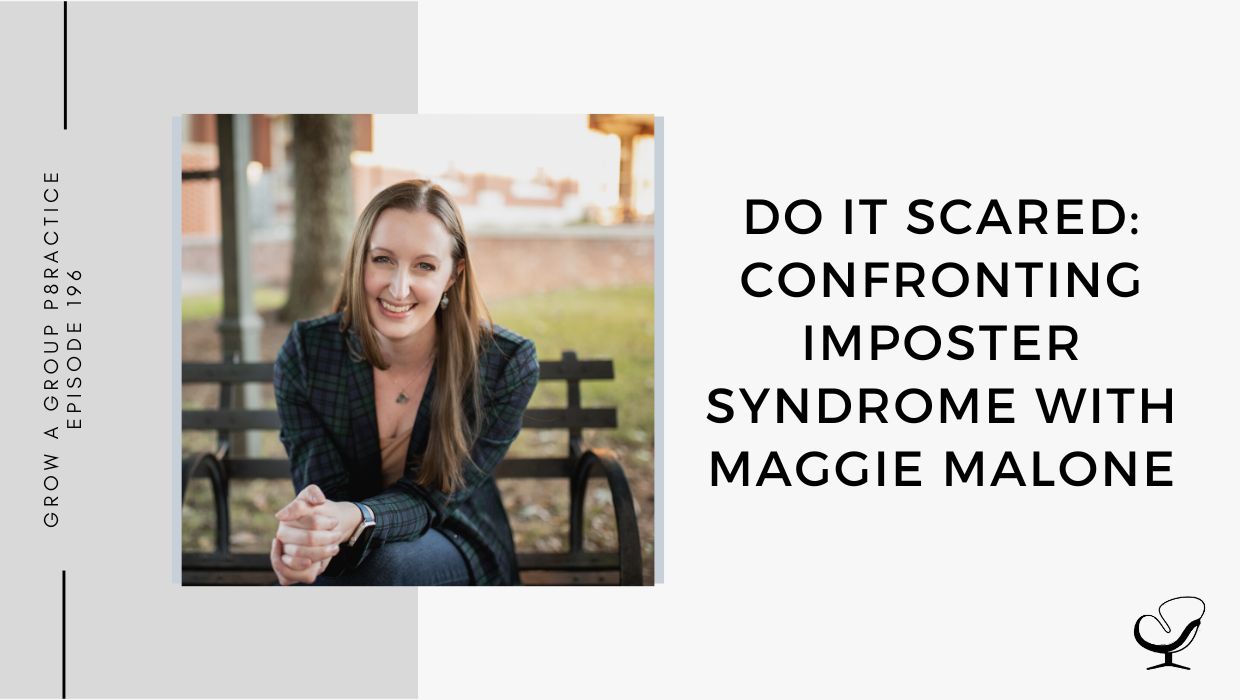Podcast (group): Play in new window | Download | Embed
Why does shame underlie imposter syndrome? What are the first steps to distancing yourself from fear-based behaviors? How can you build up your strength and courage to do something despite feeling afraid? In this podcast episode, LaToya Smith speaks about doing it scared and how to confront imposter syndrome with Maggie Malone, LCSW.
Podcast Sponsor: Pillars of Practice

Ready to take your practice to the next level? In our Pillars of Practice E-Courses, you will find FREE resources designed to help you take your private practice to the next level:
Over 20 FREE Downloadable resources and tools
8-minute expert videos on a variety of topics to help make your private practice stronger
3 hours of video training to make growing a practice quicker
What’s your phase of practice? Click here to get full access, totally free!
Meet Maggie Malone

Maggie Malone, LCSW is an individual and group therapist and the owner of Rosebud Psychotherapy. She helps women and LGBTQIA+ folks with low self-esteem and shame, anxiety disorders, and substance use concerns. Her therapeutic approach is based on acceptance and compassion. She currently offers a virtual 12-week Shame Resilience Group in Georgia.
Visit Rosebud Psychotherapy and connect on Facebook, Instagram, and YouTube.
In This Podcast
- What does imposter syndrome look like?
- Have courage to try anyway
- Shame underlies imposter syndrome
- The first steps to releasing imposter syndrome
What does imposter syndrome look like?
Even when I got to grad school, I was like, “Why did they let me in here? What were they thinking?” (Maggie Malone)
Everyone has experienced some form of imposter syndrome, and it is the inner belief or feeling that you are not as talented, capable, or any other good quality that brings you to a seat at the table with other people. It’s the belief that you are the imposter here, and not “worthy” of working alongside, teaching, or engaging with people that you perceive to be more intelligent or capable than you. The fact is that every single person has doubted themselves or felt that way at some point, and that is important to remember.
A theme throughout my life has been to challenge myself to do [things] even when I’m scared and that’s served me well … Even though I feel that doubt, I’ve gotten good at not letting it freeze me too much and helping [myself] move forward and challenging myself even when that inner voice might be saying, “What are you doing?” (Maggie Malone)
So imposter syndrome, in its simplest form, is extreme self-doubt, and an insidious voice that makes you question your abilities. Often imposter syndrome and perfectionism go hand-in-hand.
Have the courage to try anyway
What are your values? Despite being afraid or uncertain, can you challenge yourself to take actions based on your values instead of your fear? If you know that you want to be authentic and brave, can you challenge yourself to only take actions that are aligned with them, despite feeling fear or uncertainty?
I don’t have it all together, but I’m going to do it, which doesn’t mean that I don’t also experience that imposter syndrome, it’s just that with me I’ll be more upset … if I had never tried, than to try and have messed up. (LaToya Smith)
Remember that bravery is not the absence of fear; bravery is taking action despite the fear that is present.
Shame underlies imposter syndrome
Shame underlies the imposter syndrome … Shame is that painful belief that we’re not enough … The action urge that comes with shame is to shrink yourself, hide yourself, don’t let people see what might be going on … If the shame is telling you to shrink yourself and reinforces that self-doubt, then I think you’re never going to go through it. (Maggie Malone)
Shame hinders you by keeping you small. It may seem like protection and in a way it is; shame tries to keep you safe by not standing out too much. However, our lives have changed enough that standing out from the crowd doesn’t mean you’ll be hunted by a predator and killed, it means that you will be authentic in who you are, even if it differs from the norm. If you always play by the rules of others, then you will not be able to lead your life fully as your own. You need to address this sensation so that you can let go of people’s opinions of you and stand on your feet and know that you in your authentic self will be able to connect with the people who get to see that side of you.
The first steps to releasing impostor syndrome
- Name what is happening: name the sensation, the feeling, and the moment as it happens so that you can learn to separate the sensation from who you are as a person. You are a person experiencing something, you are not wholly what you experience.
- Remember common humanity: remember that you are not alone and that this experience is universal. Everyone goes through it sometimes, so you are not the odd one out.
Shame is such an isolating feeling and emotion and experience. We feel like we’re alone in it, so we want to push back at that [by] feeling connected. (Maggie Malone)
- Be kind to that part of yourself: practice intentional kindness and compassion to yourself in this moment. You could use kind words, say an affirmation, or even use physical touch by giving yourself a hug.
Remember to offer yourself curiosity and compassion over judgment.
Useful links mentioned in this episode:
- What’s your phase of practice? Click here to get full access, totally free!
- Visit Rosebud Psychotherapy and connect on Facebook, Instagram, and YouTube.
Check out these additional resources:
- Visit Rosebud Psychotherapy and connect on Facebook, Instagram, and YouTube.
- Group Practice Boss: www.practiceofthepractice.com/grouppracticeboss $149 a month
Meet LaToya Smith

LaToya is a consultant with Practice of the Practice and the owner of LCS Counseling and Consulting Agency in Fortworth Texas. She firmly believes that people don’t have to remain stuck in their pain or the place they became wounded. In addition to this, LaToya encourages her clients to be active in their treatment and work towards their desired outcomes.
She has also launched Strong Witness which is a platform designed to connect, transform, and heal communities through the power of storytelling.
Visit LaToya’s website. Connect with her on Facebook, Instagram, Strong Witness Instagram, and Twitter.

